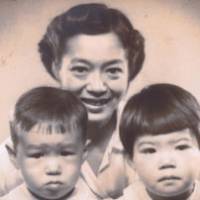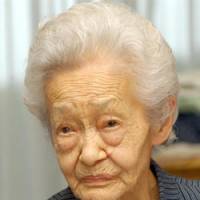In April 1945, Yukika Sohma and her four small children boarded a packed train in Mudanjiang in Manchuria bound for the port of Rajin in what is today North Korea. From there, the family took a crowded ship to Niigata Prefecture, then another train to Fukushima Prefecture to join relatives.
During their journey, the 33-year-old Sohma and her children, aged 5, 4, 2 and 6 months, had a hard time finding food and places to sleep. But with the help of people along the way, the family safely reached their destination after 10 days.
"Considering that there were so many people who could not return to Japan (when the war ended,) I was very fortunate to have made the decision to return at that time," said Sohma, now 95.
Indeed, thousands of Japanese were left behind in Manchuria after Japan surrendered on Aug. 15, 1945. Had she waited another four months to get out, she and her family could have been among them.
Sohma lived in Tokyo before going to Manchuria in 1943 to join her husband, who was drafted into the Kwantung Army in 1941 and eventually became a lieutenant. Thousands of Japanese settlers were living in Manchuria — or Manchukuo, as Japan's puppet regime in northeastern China was then known — under an immigration program, but the family's two-room house was an army residence in a protected compound.
For Sohma, the daughter of senior Diet member Yukio Ozaki, a Tokyo mayor in the early 20th century, life in Manchukuo was mostly about raising her children. Neighbors associated with each other on a daily basis, but the chances of encountering Chinese were limited to merchants with permission to do business within the Japanese community, she said.
"Life was very simple, but we lived under protection and didn't suffer from lack of food," Sohma said. "I'm sure there were more (Japanese) people whose lives were tougher — in both Manchuria and Japan."
As the war dragged on, Sohma began to sense, however, that the tide was turning against Japan, even though she and the rest of the Japanese public were kept in the dark by a press tightly controlled by government censors.
Around the time Sohma gathered her kids and left Manchuria, a move her husband agreed on, Japan was losing the war on various fronts, and U.S. air raids had already begun the previous year, laying waste to many Japanese cities.
But newspapers continued to stand behind the Imperial forces, touting Japan's "victories" and encouraging the public to support the war effort.
Sohma meanwhile was seeing daily life in Manchukuo deteriorate, and she felt Japan was fighting a losing war.
"My husband's friends in the army as well as my neighbors' husband were heading to different front lines, and that made me realize the war wasn't progressing favorably," she said.
The increased deployments were coupled with increased food rationing, especially sugar and sake.
Sohma recalled that one day in late 1944, she realized the military airplanes always buzzing over the community were no longer around. According to her book "Kokoro ni Kakeru Hashi" ("A Bridge Crossing over the Hearts"), published in 1987, this was because Japanese forces in China were being diverted to join in the Battle of Okinawa, although she only learned of this much later.
Manchuria was becoming more unstable, but the situation in Japan was worse. People were constantly in fear of air raids, and food rationing was severe — even to the point that emigration to Manchukuo continued because of the prospects of more food in China.
Sohma, however, realized Japan was on its way to defeat and it would be too risky to remain in Manchuria.
"So many people asked me why I was leaving, but Manchuria was in a state of war, and it was not a place for women and children. Even if we couldn't get food, I thought it would be better to be in Japan than stay there," she said.
Sohma's decision to leave was also partly influenced by her father, who had gained some fame in 1912 by presenting cherry trees to Washington that today line the banks of the Potomac River. Having visited many Western countries during his career as a Diet member since 1890, Ozaki held a wide perspective of world affairs.
When Sohma saw him in Japan in early 1943, Ozaki, then a vocal critic of the government's militarism, had told her his views on the European front in relation to Asia, and revealed his fear of a Soviet invasion.
Indeed, Soviet forces invaded Manchuria on Aug. 8, 1945, a week before Japan's surrender, trapping many Japanese in the area.
Ironically, however, it was also because of Ozaki's influence that Sohma met with hostility after arriving in Fukushima. She soon moved her family again, to property in Karuizawa, Nagano Prefecture, owned by her father. There the family stayed until the war ended.
The family suffered a serious food shortage there, and her children's health deteriorated. She even tried to get her kids to eat weeds that grew in their yard. Somehow they survived and Sohma's husband reunited with them later that year.
After the war, Sohma became active in promoting peace and democracy like her father. In 1977, she established the Japan-Korea Women's Friendship Association. Two years later, she launched the Association for Aid and Relief, Japan's first international nongovernmental organization, which aims to remove land mines in conflict areas and provide support to refugees and people with disabilities.
Looking back at the time when the military held power and how that influenced the lives of so many Japanese, Sohma stresses that people today should cherish their freedom.
"Young people should remember how wonderful it is that you are free to make your own decisions. I would like people to think hard about how they can make use of their ideas and decisions for the world," she said.



















With your current subscription plan you can comment on stories. However, before writing your first comment, please create a display name in the Profile section of your subscriber account page.